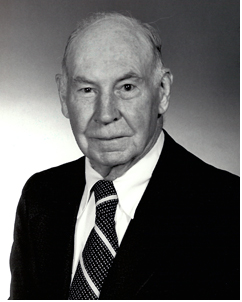Mr. Wilfred W. Hosking
 Mr. Wilfred W. Hosking was born in
New York on June 2, 1899 and attended Clarkson College in Potsdam, New York.
Mr. Wilfred W. Hosking was born in
New York on June 2, 1899 and attended Clarkson College in Potsdam, New York.
He began his distinguished 52-year career at Picatinny Arsenal in 1916 as a labor boy. He steadily advanced through the ranks to become the Director of the arsenal's Industrial Services Division, a position he held for 27 years. As a focal point for munitions research, development, and production, the division engaged in precision work on components of conventional and nuclear ammunition.
In 1939, he developed an effective skeletal organization for munitions production which did much to improve America's capability in that area on the eve of WWII. As a recognized authority on ammunition production, he was frequently called upon to furnish urgently needed items of ammunition to American and allied forces in WWII.
He was a driving force behind the critically important Selected Ammunition Program, which enhanced the effectiveness of several categories of conventional munitions. Under his leadership, large scale munitions production processes were established which served as the industry standard in the U.S. Mr. Hosking's advice on ammunition production was regularly solicited by the top management of America's leading industrial organizations.
Among his other significant contributions to Army Ordnance were production of the low-altitude bomb fuse used in General Doolittle's surprise bombing raid on Tokyo in 1942; production of the 3.5-inch rocket, which helped stem communist armored attacks during the Korean War; and coordination with the Atomic Energy Commission to overcome difficulties and surpass production goals in nuclear weapons production.
Mr. Hosking achieved the singular distinction of being the only civilian in the history of Picatinny Arsenal to hold a military position there when he was twice appointed Acting Deputy Commander.